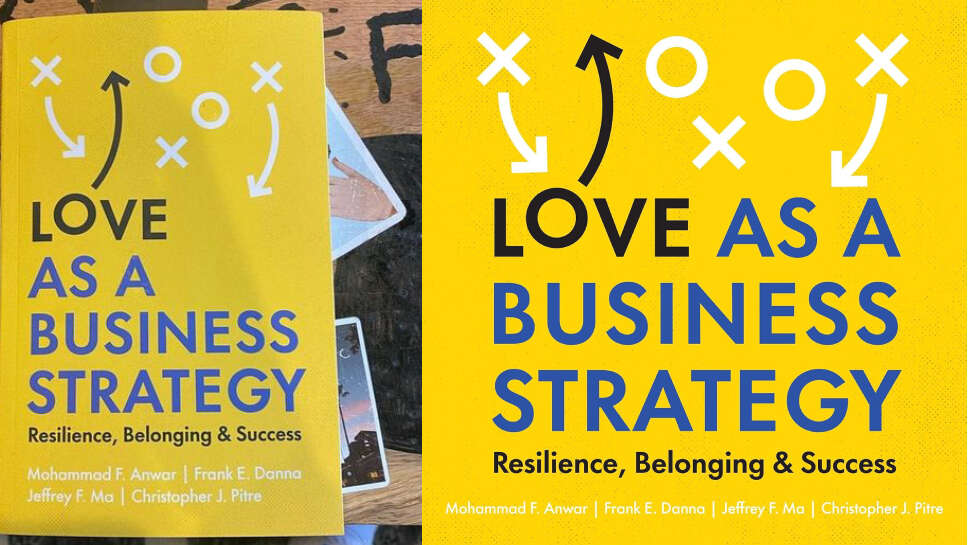7 Practical Business Lessons from Love as a Business Strategy by Mohammad F. Anwar

Mohammad F. Anwar offers a novel viewpoint on how love, empathy, and human connection could change our business practices in his book Love as a Business Strategy. This method offers a road map for creating lasting success by putting connections first rather than concentrating just on revenues. Expanded to assist you grasp how you might apply these seven useful lessons from the book in your own company,
1. Give relationships top importance. Strong relationships are, Anwar stresses, the foundation of success in every company. Investing in connections pays long-term benefits whether with staff, clients, or other stakeholders. Spend some time learning about the people you deal with and try to strengthen those ties. A little more work in establishing rapport and trust will help to create a more cooperative and motivating workplace where everyone feels appreciated and heard. Relationships flourish; businesses flourish—that's basic.
2. Embrace empathy. Though in Anwar's opinion it's a game-changer for commercial success, empathy is sometimes considered as a "soft skill." Knowing the feelings, difficulties, and points of view of others enhances not only communication but also team cohesion and enables delivery of first-rate client experiences. Developing empathy requires attentive listening, being present, and really sympathetic concern for the experiences of others. This translates in a commercial setting to improved teamwork, contented workers, and more devoted consumers. People that feel understood are more willing to go above and above for your company.
3. Encourage Open Communication. Open communication is among the key elements of a strong company. Establishing an environment where comments are welcomed—not only tolerated—helps to foster responsibility and confidence. Employees who feel secure to speak up are more likely to be creative thinkers, early problem solvers, and to believe their opinions count. Good client connections also result from open communication, which lets you swiftly answer questions and change with the times.
4. Guide with intent. Inspired and motivated employees need a clear sense of purpose. Anwar contends that leaders should clearly state the objectives and ideals of their company so that everyone is in line and aiming towards the same ones. A deliberate company builds community and attracts staff members driven by a cause. People want to know their efforts count and that they are a part of something greater than themselves. Your staff members get more involved and dedicated when they can relate to the goals of the company.
5. Any great company's foundation is its employees, hence Anwar advises that first focus should be on their well-being. Whether through flexible work hours, wellness initiatives, or a supportive work culture, this involves helping with mental, emotional, and physical health. Employees who feel cared for are more content, more effective, and less prone to burn-out. Businesses may lower turnover rates, raise morale, and build a better, more sustainable workplace by giving their employees well-being top priority.
6. Learn appreciation and recognition. Two strong motivators are recognition and thanksfulness. Leaders should, Anwar emphasises, routinely acknowledge and celebrate the diligent effort of their staff. People's attitude towards their work may change greatly with a simple thank-you or public appreciation. It's more about making people feel appreciated for their achievements than about rewarding them constantly. Frequent expressions of gratitude help to create a good working environment in which employees are driven to perform their best and feel pleased of their achievements.
7. Concentrate on client relationships. Developing great customer relationships is more crucial in the competitive corporate world of today than it has been. Anwar encourages seeing consumers as participants in your company trip rather than as transactions. This implies really knowing their wants, offering individualised service, and keeping regular communication. Years of trust and loyalty are created when you treat consumers with the same respect and care that you do your staff. Not only do loyal consumers return often, but they also become brand champions who help your company get known.
Including these seven lessons into your company policies will help you create closer, more significant bonds at all levels. Whether they are staff members or consumers, your organisation becomes more compassionate, sympathetic, and efficient when you give people top priority. Businesses run with love and connection ultimately not only provide superior results but also create settings in which everyone engaged feels appreciated, understood, and driven to succeed together.
--
-- Thanks For Reading --
You Might Also Like: 7 Key Lessons from Scarcity: The New Science of Having Less and How It Defines Our Lives by Sendhil Mullainathan and Eldar Shafir
